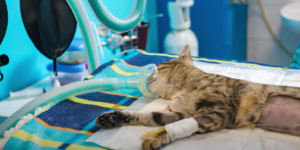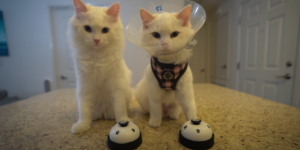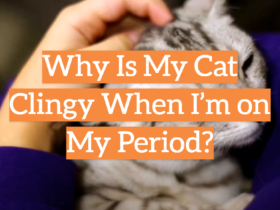Ah, cats—we love them for the seemingly mysterious ways in which they go about their days, don’t we? At times it can be difficult to understand why our furry feline friends do certain things.
And if your male cat is sleeping a lot more than usual following his neutering, you might find yourself scratching your head wondering what’s going on.
Don’t worry though – there are perfectly reasonable explanations as to why your kitty may not be up and running around as he used to!
In this blog post, we’ll explore some of the common reasons behind increased sleepiness after neutering in male cats, so that you can better understand how best to ensure that your pet stays happy and healthy. Read on to learn more!
Having Your Male Cat Neutered
The first step in understanding why your male cat might be sleeping more is knowing a bit about the neutering process. Neutering is the surgical removal of the testicles and is done to prevent cats from reproducing.

It not only reduces the risk of certain diseases, but it also helps with controlling pet overpopulation and aggressive behaviours such as spraying.
The Behavior of Male Cats
This is especially true for male cats because they usually have higher energy levels than female cats. [1]
A Cat’s Recovery After Neutering
The main cause for increased sleepiness in male cats is recovery from the neutering surgery. After being put under anaesthesia, cats may feel tired and sore for a few days.

It’s also quite common for cats to be less active than usual during this period, so it’s important to keep an eye on their behaviour and make sure that they are eating and drinking enough.
Sign To Watch for After Neutering Your Cat
Though it’s normal for male cats to be more sleepy than usual after being neutered, there are some signs that may indicate a bigger issue.
Reasons Why Your Cat May Sleep A Lot After Neutering
He May Be Tired
As we mentioned earlier, the primary reason why your male cat might be sleeping a lot after being neutered is due to the surgery itself.

Since cats are sensitive to anaesthesia and feel sore for days afterwards, it’s not uncommon for them to want more rest than normal as they recover.
The Side Effects of Drugs
In addition to being tired from the surgery, it’s also possible that your cat may be sleeping a lot due to the side effects of the drugs used during or after his neutering procedure.

Drugs like painkillers, sedatives, and antibiotics can all cause drowsiness and make cats sleep more than usual. [2]
His Body Is Healing
Your cat may be sleeping a lot because his body is healing from the surgery. Neutering is a major operation and it takes time for the body to adjust and repair itself afterwards.

So it’s not uncommon for cats to sleep more than usual until they are feeling better again.
Your Cat’s Wound Isn’t Healing
It’s important to keep an eye on your cat’s wound after his neutering procedure. If the incision doesn’t seem to be healing properly, then it may be a sign of infection and you should take him to the vet right away.
How Long Will Your Cat’s Sleep Patterns Be Normal?
It’s normal for cats to sleep more than usual after being neutered, but if you notice that your cat is sleeping excessively or the behaviour persists for more than a week then it may be time to bring him in for a check-up.

In most cases, your cat should recover from his surgery within a few days and return to his normal sleeping patterns.
Helping Your Cat Regain Normal Habits
If your cat is still sleeping more than usual, there are several things you can do to help him regain his normal habits. First, make sure that he’s drinking plenty of water and eating nutritious meals.
Additionally, provide him with plenty of toys and activities to keep him entertained throughout the day and make sure that he has a comfortable place to rest. If your cat is still struggling after neutering then you may want to consider talking to a vet or behaviourist for further advice.

Finally, it’s important to be patient and understanding when it comes to your cat’s sleeping patterns after neutering. Remember, this is a major operation and cats need time to recover from the surgery.
FAQ
Is it normal for a cat to sleep a lot after being neutered?
Yes, it is completely normal for a cat to sleep more than usual after being neutered. This is due to the surgery itself as well as the side effects of drugs used during or after the procedure.
It’s important to monitor your cat’s behaviour and make sure that he’s eating and drinking enough water throughout this period.
How long does it take for a cat to recover from being neutered?
In most cases, cats will recover from their surgery within a few days and return to their normal sleeping patterns. However, if your cat is still sleeping more than usual after a week then it’s best to bring him in for a check-up.
What can I do to help my cat regain normal habits after neutering?
There are several things you can do to help your cat regain his normal habits. Providing him with plenty of toys and activities to keep him entertained throughout the day is a great way to encourage activity.
Additionally, make sure that he’s eating nutritious meals and drinking plenty of water. If he doesn’t seem interested in food then talk to your vet about adding a supplement to his diet. Finally, you may want to consider talking to a vet or behaviourist for further advice.
What are the side effects of neutering a male cat too early?
Neutering a male cat too early can have serious repercussions on their health and development.
Early neutering is linked to physical problems such as decreased muscle mass, an increased risk of urinary tract infection, and testicular cancer. It can also lead to behavioural issues such as aggression and marking behaviour.
How long does it take for male cat hormones to balance after neutering?
It typically takes around two to four weeks for male cat hormones to balance after neutering. During this time, it’s important to monitor your cat’s behaviour and make sure that he’s eating and drinking enough water throughout the process.
Additionally, it may also be beneficial to provide him with plenty of toys and activities to keep him entertained during this period.
How long is a cat groggy after neutering?
A cat may be groggy for up to 24 hours after neutering. During this time, it’s important to make sure that he is comfortable and free from stress. Additionally, provide him with plenty of water and nutritious meals to help speed up his recovery process.
If your cat is still sleeping more than usual or the behaviour persists for more than a week then it’s best to bring him in for a check-up.
How should a male cat act after being neutered?
After being neutered, a male cat should return to his normal habits. He may sleep more than usual during the first week after surgery but should gradually become more active and alert as he recovers.
If your cat is still sleeping more than usual or displaying abnormal behaviour then it’s best to bring him in for a check-up.
Additionally, providing him with plenty of toys and activities to keep him entertained throughout the day is a great way to encourage activity.
Are male cats nicer after neutering?
In some cases, neutering can help to reduce aggressive or territorial behaviours in male cats.
However, neutering won’t necessarily make a cat nicer as this behaviour is largely determined by environment and training. Additionally, it’s important to remember that all cats have different personalities.
What should I do if my male cat is peeing everywhere after being neutered?
If your male cat is exhibiting inappropriate urination or marking behaviour after being neutered then it’s best to speak with your vet. An underlying medical condition could be the cause of the issue and may require additional treatment.
Additionally, providing him with plenty of toys and activities to keep him entertained may help reduce stress and eliminate the behaviour. Finally, it’s important to maintain a consistent litter box cleaning routine.
What should I do if my male cat is aggressive after neutering?
If your male cat is exhibiting aggressive behaviour after being neutered then it’s best to speak with a vet orist. An underlying medical condition could be the cause of the issue and may require additional treatment.
Additionally, providing him with plenty of toys and activities to keep him entertained may help reduce stress and eliminate the behaviour. It’s also important to provide a safe and secure environment for your cat so he can feel comfortable and relaxed.
Additionally, it may be beneficial to speak with a professional about potential behavioural modification techniques that could help manage your cat’s aggression.
What should I do if my male cat is depressed after neutering?
If your male cat is exhibiting signs of depression after being neutered then it’s best to speak with a vet orist. An underlying medical condition could be the cause of the issue and may require additional treatment.
Additionally, providing him with plenty of toys and activities to keep him entertained may help reduce stress and eliminate depression. It’s also important to provide a safe and secure environment for your cat so he can feel comfortable and relaxed.
Additionally, it may be beneficial to speak with a professional about potential behavioural modification techniques that could help manage your cat’s depression.
What are some tips for helping my male cat recover after neutering?
It’s important to keep your male cat comfortable and stress-free during recovery. Providing him with a warm, quiet area and regular meals can help him heal faster.
Additionally, providing plenty of water and nutritious meals (especially high-protein foods) is essential to support his recovery. It’s also important to monitor his activity and behaviour for any signs of pain or distress.
Finally, providing your male cat with plenty of toys and activities can help keep him entertained during the day and encourage movement.
What should I do if my male cat is still sleeping a lot after neutering?
If your male cat is still sleeping more than usual or displaying abnormal behaviour then it’s best to bring him in for a check-up.
Additionally, providing him with plenty of toys and activities to keep him entertained throughout the day is a great way to encourage activity.
If necessary, speak with your vet about potential medications or supplements that may help reduce anxiety and fatigue.
Finally, it’s important to make sure he is getting adequate exercise each day. Taking him for regular walks and providing interactive toys can help keep him active.
What should I do if my male cat is losing weight after neutering?
If your male cat is losing weight after being neutered then it’s best to speak with your vet. An underlying medical condition could be the cause of the issue and may require additional treatment.
Additionally, providing him with plenty of nutritious meals (especially high-protein foods) is essential to help him gain weight. It’s also important to provide your cat with plenty of toys and activities to keep him entertained throughout the day, as well as regular exercise each day.
Finally, it may be beneficial to speak with a professional about potential behavioural modification techniques that could help manage your cat’s weight loss.
What should I do if my male cat is having litter box issues after neutering?
If your male cat is having litter box issues then it’s important to speak with a vet orist. An underlying medical condition could be the cause of the issue and may require additional treatment.
Additionally, providing him with plenty of toys and activities to keep him entertained throughout the day is a great way to keep him active and divert his attention away from destructive behaviours.
It’s also important to provide a clean, safe environment for your cat so that he can feel comfortable when using the litter box.
What should I do if my male cat is exhibiting aggressive behavior after neutering?
If your male cat is exhibiting aggressive behavior then it’s best to speak with a vet orist. An underlying medical condition could be the cause of the issue and may require additional treatment.
It’s also important to provide a safe and secure environment for your cat so he can feel comfortable and relaxed. Finally, it may be beneficial to speak with a professional about potential behavioral modification techniques that could help manage your cat’s aggression.
How long does it take for a male cat to recover fully after being neutered?
The recovery time for a male cat after being neutered depends on the specific procedure and the individual cat. Generally speaking, most cats will make a full recovery within 1-2 weeks.
During this time, it’s important to provide your cat with plenty of rest and a nutritious diet along with regular vet check-ups to monitor for any signs of pain or distress.
Additionally, providing your male cat with plenty of toys and activities can help keep him entertained during the day and encourage movement. This will help ensure that he recovers fully and quickly after being neutered.
How can I tell if my male cat is still in pain after neutering?
The best way to tell if your male cat is still experiencing pain after being neutered is by monitoring his behavior. If he seems more lethargic and restless than usual, then it’s possible that he may be in discomfort.
Additionally, keep an eye out for any signs of excessive licking or grooming in the area where he was neutered, as this can be a sign that something is wrong.
If you suspect your cat may be in pain, then it’s important to contact your vet for further advice and treatment.
How often should I bring my male cat in for check-ups after neutering?
It’s important to bring your male cat in for regular check-ups after he has been neutered.
The frequency of the visits will depend on the individual cat and the procedure that was performed, but generally speaking it’s recommended that cats are checked up at least once every 3-6 months.
During these visits, your vet will be able to monitor your cat’s progress and provide helpful advice on what you can do to ensure he remains healthy after neutering.
How can I help my male cat maintain a healthy weight after neutering?
It’s important to ensure that your male cat receives a nutritious diet and regular exercise after being neutered.
It’s also beneficial to provide him with plenty of toys and activities throughout the day to keep him entertained, as this will help encourage movement and prevent excessive weight gain.
Additionally, it’s important to practise portion control and only feed your cat the recommended amount of food. Finally, it’s beneficial to weigh him regularly and speak with a vet if you suspect that he may be gaining too much weight.
How can I help my male cat adjust to using a litter box after neutering?
It’s important to provide your male cat with plenty of positive reinforcement when he uses the litter box by offering him his favourite treats or toys. Additionally, it’s beneficial to keep the litter box clean and in an area that is easily accessible for your cat.
It’s also important to provide your cat with a safe and secure environment so that he feels comfortable and is able to use the litter box without feeling threatened or scared.
Finally, if necessary, you can speak with a professional about potential behavioral modification techniques that may help your cat adjust to using the litter box more easily.
Why is my male cat sleeping a lot after neutering?
Neutering can cause significant changes in your male cat’s behavior, including increased lethargy and sleepiness. This is perfectly normal and shouldn’t be cause for concern, as it may take time for your cat to adjust to the physical and emotional changes that have taken place.
Additionally, it’s beneficial to provide your cat with plenty of rest and a nutritious diet, as this will help ensure that he recovers fully.
Finally, providing him with plenty of toys and activities throughout the day can help keep him entertained and encourage movement, which will help ensure that he is able to make a full recovery after being neutered.
Why should I consider neutering my male cat?
Neutering your male cat can provide a range of benefits, including improved behavior and decreased risks of certain diseases. Neutering can also help reduce the number of unwanted cats in the population, as it prevents them from reproducing.
Additionally, neutered cats tend to live longer lives than un-neutered cats, as they are less likely to suffer from illnesses or injuries.
Does neutering a male cat help with behavior issues?
Yes, neutering your male cat can help reduce or even eliminate some unwanted behaviors. Neutering can help decrease aggressive tendencies and territorial marking, as well as reduce the chances of him roaming away from home in search of a mate.
It can also reduce the chances of your cat getting into fights with other cats or animals, as well as reduce the risk of him developing certain diseases. Finally, neutering can help reduce unwanted behaviors such as spraying and yowling.
Do neutered male cats still roam or mark territory?
Neutering can reduce the chances of your male cat roaming or marking his territory, but it is not 100% effective. It is important to provide your cat with a safe and secure environment that he feels comfortable in, as this will help reduce the likelihood of him trying to explore outside of the home.
Additionally, it’s beneficial to keep your cat away from other cats and animals in order to reduce the chances of him becoming aggressive or territorial. Finally, if necessary, you can speak with a professional about potential behavioral modification techniques that may help prevent roaming and marking behaviors.
Does neutering a male cat help with weight gain?
Neutering a male cat can help reduce the chances of him becoming obese, as it reduces levels of testosterone that can lead to overeating. Additionally, it’s important to provide your cat with plenty of nutritious food and appropriate portions in order to keep his caloric intake at a healthy level.
It’s also beneficial to provide your cat with plenty of toys and activities throughout the day in order to encourage movement and help him maintain a healthy weight.
Finally, if necessary, you can speak with a professional about potential dietary modifications that may be beneficial for your cat’s overall health.
Does neutering a male cat help with litter box issues?
Yes, neutering your male cat can help reduce or even eliminate some unwanted behaviors associated with using the litter box. Neutering can reduce territorial marking and spraying behaviors, as well as reduce the chances of him feeling threatened or scared.
Additionally, it’s beneficial to provide your cat with a clean and comfortable litter box in order to ensure that he feels safe when using it.
Finally, if necessary, you can speak with a professional about potential behavioral modification techniques that may help encourage proper use of the litter box.
Do neutered male cats need to be fed a special diet?
It’s important to provide your cat with a balanced, nutritious diet in order to ensure he is getting all of the essential nutrients needed for proper growth and development.
Neutering doesn’t necessarily require any changes to his diet, but it can be beneficial to look into providing him with food specifically designed for neutered cats, as this will help ensure that his caloric intake is at a healthy level. Additionally, if your cat suffers from any health problems or dietary restrictions, it’s beneficial to speak with a professional about potential dietary modifications that may be beneficial for him.
Does neutering a male cat help with medical issues?
Neutering your male cat can reduce the chances of him developing certain illnesses and diseases. For example, it can reduce the risk of testicular cancer, prostate disease, and urinary tract infections.
Additionally, neutering can reduce the chances of your cat getting into fights or encountering other animals that may pose a risk to his health.
Finally, it’s beneficial to take your cat for regular check-ups in order to catch any potential medical issues before they become serious.
Do neutered male cats still need regular grooming?
Yes, it’s important to continue providing your cat with regular grooming even after he has been neutered.
Grooming not only helps keep his coat clean and healthy, but also helps reduce the chances of him developing matted fur or skin problems due to dirt and debris buildup.
Does neutering a male cat help with behavioral problems?
Yes, neutering can help reduce the chances of your male cat exhibiting certain unwanted behaviors. For example, it can reduce the likelihood of him displaying aggression or territorial behavior, as well as reduce the chances of him roaming and marking outside of his home territory.
Additionally, it can be beneficial to provide your cat with plenty of toys and activities throughout the day in order to help encourage positive behaviors.
Finally, if necessary, you can speak with a professional about potential behavioral modification techniques that may be beneficial for your cat’s overall behavior.
Can neutering a male cat help with weight problems?
Yes, neutering can help reduce the chances of your cat developing obesity related issues. After being neutered, it’s beneficial to provide your cat with a balanced and nutritious diet, as well as frequent exercise sessions.
Doing so can help ensure that your cat maintains a healthy weight and lifestyle. Additionally, it’s beneficial to speak with a professional about any potential dietary modifications that may be beneficial for your cat.
Useful Video: Do male cats change after being neutered?
Conclusion
Ultimately, the amount of rest and sleep your neutered male cat is getting is likely due to the surgery and its effects. While it may take longer than usual, he should eventually bounce back to his happy and energetic self. In the meantime, be sure to call your veterinarian if you notice any concerning signs or symptoms that last more than a couple of days.
Additionally, providing plenty of comfortable sleeping areas with soft cushions or blankets may help entice him off your lap and onto a more appropriate snooze spot. As tempting as it can be to let them stay put, engaging play sessions and providing lots of toys may also help make up for the extra nap time.
And don’t forget to show him affection throughout! Remembering that quality bonding time with your feline friend will go a long way towards helping him feel better — mentally and physically.
References:
- https://www.millplainvet.com/site/blog/2022/02/28/male-cat-neutering-recovery-behavior
- https://kittydevotees.com/2022/06/24/why-is-my-male-cat-sleeping-a-lot-after-neutering/










Leave a Reply